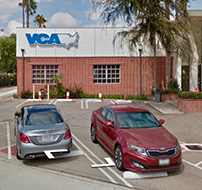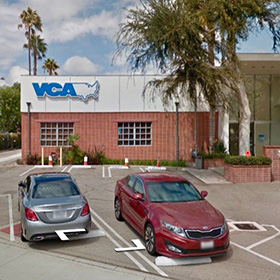

Google Street View screen shot
Thirty years after its founding, Veterinary Centers of America, better known as VCA, is poised to become part of the Mars Petcare global conglomerate. VCA headquarters will remain on West Olympic Boulevard in Los Angeles.
Mars Inc. plans to acquire VCA Inc. in what is perhaps the largest corporate deal the veterinary profession has ever seen.
Mars, parent of Banfield Pet Hospital, has agreed to buy rival VCA for $93 a share, or about $9.1 billion, including $1.4 billion in debt. VCA, owner of the largest publicly traded veterinary hospital chain in the world, with nearly 800 practices, announced the deal this morning. The agreement has been unanimously approved by the boards of directors of both companies and is expected to close in the third quarter of the year, a news release stated.
The deal is subject to VCA shareholder approval and regulatory approval, according to the news release. General information from the Federal Trade Commission about merger reviews states that the FTC and U.S. Department of Justice "review most of the proposed transactions that affect commerce in the United States and are over a certain size," and that "for the most part, current law requires companies to report any deal that is valued at more than $78.2 million to the agencies so they can be reviewed."
An FTC spokeswoman declined to confirm today whether the agency is reviewing the Mars-VCA transaction. If the FTC announces that it's examining the agreement, a 30-day public comment period will follow.
Mars Chief Executive Officer Grant F. Reid said in a prepared statement: "We are thrilled to welcome VCA to the Mars family and to our portfolio of brands and businesses around the world. VCA is a leader across pet health care and the opportunity we see together — for pets, pet owners, veterinarians and other pet care providers — is tremendous. We have great respect for VCA, with whom we share many common values and a strong commitment to pet care. Together, we will be able to provide even greater value, better service and higher quality care to pets and pet owners."
The release added that VCA will operate as a "distinct and separate business unit" within Mars Petcare and continue under the direction of Bob Antin, VCA co-founder, chief executive, chairman and president.
VCA is a giant among owners of practice chains, but Mars is bigger. Privately owned, Mars is not subject to the public reporting of assets, but its known holdings beyond candy, food and drink make it an indisputable behemoth in animal-health and veterinary landscapes. As the parent of Banfield, Mars owns about 960 general practices, most of which are in the United States but also in Mexico and Canada. Mars' veterinary-hospital portfolio includes 57 specialty and emergency clinics that were part of its 2015 buyout of BluePearl and another 58 formerly independent practices that came with its purchase of PetPartners in 2016.
The rapidly expanding company shows no sign of slowing. Growth at both VCA and Banfield have spurred concerns from veterinarians about the future of a profession that's comprised largely of independent practices whose numbers are dwindling as a result of corporate buyouts. Veterinarians also have witnessed a decade's worth of mergers and acquisitions that have impacted their practices by narrowing the number of players in nearly every sector: pharmaceutical manufacturing, technological services, product distribution and equipment sales.
In a discussion on the Veterinary Information Network, an online community for the profession, veterinarians reacted with concern about the Mars-VCA deal. Dr. Mark Beebe, a practitioner from East Lyme, Connecticut, predicted a future without much independent practice.
"I have feared for the younger and future DVMs to be," Beebe said. "Where will they work? Will they be self-employed? How will they service their enormous school debts? What choices will clients have? If they want to keep their veterinarian, will they be able to?
"It seems to me ... slowly but surely, non-veterinarians are having more and more impact on what and how we will be practicing down the line. I'm saddened by this," he added.
Others cited concerns that the consolidation trend will restrict the marketplace.
"Mergers do one thing very well — limit choice," observed Dr. Brad Ochstein, of Palm Beach, Florida. "That is why we have anti-trust laws, although they seem to be pretty toothless these days."
"All the more reason for all of us to vote with our dollars and patronize non-chain family businesses of all stripes," responded Dr. Valeri Devaney of Sugar Land, Texas.
The VIN News Service was unable to reach VCA president and CEO Antin for comment Monday. In an interview in June 2014, Antin said he believed that there would always exist a mix of corporate-owned and independently owned veterinary practices. "It will never be all or none," he said. "It's inappropriate to be all or none."
He added that in the face of declining visits to veterinary hospitals — a problem for independent and chain practices alike — "the biggest problem is how to keep the people coming. You need consolidation [of practices]."
Antin also downplayed the importance of clinic ownership, saying, "I think who owns the hospital is not relevant." The more important issue, he said, is how well a hospital serves its clients and patients. "If you can walk in and out of a vet hospital and be happy, you win. I don't care who owns it," Antin said.
Art Antin, chief operating officer, co-founder of VCA and brother of Bob Antin, said during the same interview in 2014 that he could not predict VCA's ultimate size.
"I assume there's a theoretical endpoint, but I don't think we know it yet," Art Antin said. "The profession itself is evolving. You could have [owners of] two or three practices near each other who wake up one day and say, 'You know what? We're competing. Let's come together [instead].' It's evolving because the demographics of the graduating class [of veterinary schools] has changed, and from what I understand, many of the graduates don't want to own practices. So we don't know where it's going to go."
In an open letter to employees dated today, VCA co-founders Antin, Antin, and Neil Tauber, senior vice president of development, said they did not solicit the Mars buyout. "When senior members of Mars' management approached us with an offer to join their organization, it was with mixed emotions that we considered their proposal," they wrote. "... After thorough deliberations, we determined that this is a unique opportunity for all of the company's stakeholders, especially our employees."
The letter goes on to say: "We've spent considerable time with their senior leadership team, and we truly believe that they are representative of an organization of 'real people' with a wealth of knowledge and the same core principles that have guided VCA since our inception. Mars understands our business and our values, as well as our operating philosophy and the way we invest long-term in our company and in the profession."
An employee FAQ, also posted on the company website, states that the corporate leadership team will remain in place, as will hospital field leaders; and that pay and benefits will remain the same, at least at the outset. VCA has 23,000 employees.
In addition to its U.S. practices, VCA owns one of the two biggest diagnostic laboratories in the country and a digital medical equipment company. It owns Associate Veterinary Clinics, a chain of 86 practices in Canada. VCA has financial ties to VetSource, a pharmaceutical distributor, and is a minority owner of Vetstreet.com, a provider of online marketing and client-communication services for veterinary practices.
Those holdings apparently would transfer to Mars as part of the purchase agreement.